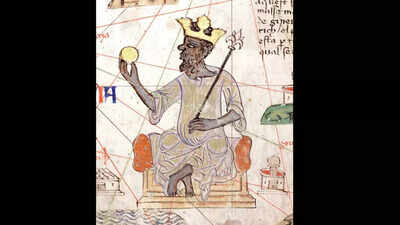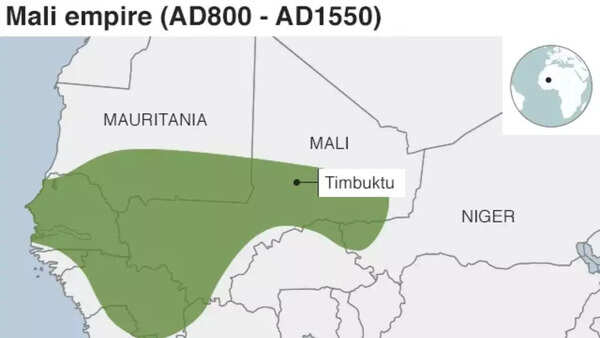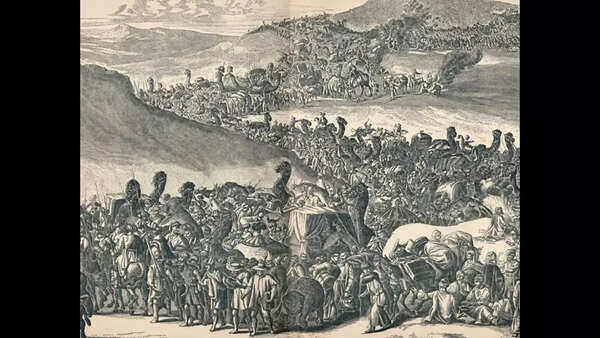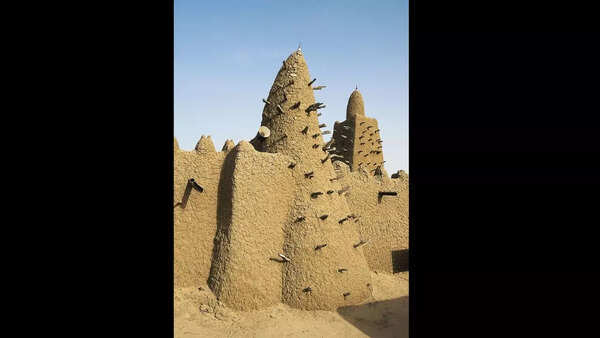ARTICLE AD BOX

Surpassing the modern-day billionaires like Elon Musk and Jeff Bezos, Mansa Musa, the 14th-century king of the Mali Empire, is often regarded as the richest person in history. With an estimated fortune of $131bn (£99bn), he is the wealthiest man in modern history.Mansa Musa, the legendary ruler of the Mali Empire, rose to power in 1312 after his brother vanished during a mysterious Atlantic voyage. Under his leadership, Mali became one of the wealthiest and most powerful empires in the world, controlling half of the Old World's gold supply and vast trade networks. Beyond riches, Mansa Musa invested in education and architecture, transforming Timbuktu into a global center of learning.
His legacy endures as a symbol of Africa’s golden age of wealth, culture, and scholarship.
Mali’s two rulers: Mansa Musa and his brother
Mansa Musa was born in 1280 into a family of rulers, and his brother Mansa Abu-Bakr ruled the empire until 1312. Abu-Bakr's fascination with the Atlantic Ocean led him to embark on an expedition with a massive fleet of 2,000 ships and thousands of men, women, and slaves. However, they sailed off and never returned, leaving behind a trail of mystery and speculation.
Some historians, like Ivan Van Sertima, have suggested that they might have reached South America, but there is no concrete evidence to support this claim.
Following Abu-Bakr's disappearance, Mansa Musa inherited the throne and went on to expand the kingdom significantly. He annexed 24 cities, including Timbuktu, and the empire grew to stretch over 2,000 miles, covering parts of modern-day Senegal, Mauritania, Mali, Burkina Faso, Niger, The Gambia, Guinea-Bissau, Guinea, and Ivory Coast.
Mansa Musa’s Mali empire

Source: The BBC
The Mali Empire, under Mansa Musa's rule, controlled vast resources, including gold and salt, which significantly contributed to its wealth. The empire was responsible for producing nearly half of the Old World's gold, cementing Mansa Musa's position as one of the wealthiest individuals in history, with an estimated net worth of $400-500 billion in today's currency. The empire's rich gold deposits, salt mines, and strategic trade routes across West Africa enabled Mansa Musa to amass this enormous wealth, surpassing even modern-day billionaires like Elon Musk and Jeff Bezos.
Mansa Musa’s journey to Mecca

Source: The BBC
As Mansa Musa's caravan journeyed back home, it passed through Egypt once more. Some accounts suggest he tried to stabilize the local economy by borrowing back gold at steep interest rates, while others claim his extravagant spending left him short on gold. Nonetheless, his three-month stay in Cairo made a lasting impression, with locals still praising him 12 years later. The lavish gold distribution caused economic instability in the region for over a decade, with estimated losses of $1.5 billion due to gold devaluation.
The caravan's grandeur was mesmerizing, and Cairo witnessed an even more dazzling display of their wealth.
When gold lost its shine: Mansa Musa and the Cairo collapse
Mansa Musa's visit to Cairo left an indelible mark on the city, with the Egyptian historian al-Umari recounting 12 years later that the people of Cairo still spoke highly of the Malian king. His extravagant generosity during his three-month stay, where he lavished gold upon the locals, had a profound impact on the regional economy.
The sudden influx of gold caused its value to plummet, leading to a decade-long economic downturn.
According to estimates by the US-based technology company, Mansa Musa's pilgrimage resulted in approximately $1.5 billion (£1.1 billion) in economic losses across the Middle East due to the depreciation of gold. On his return journey, Mansa Musa again passed through Egypt, where he attempted to stabilize the local economy by borrowing gold back from lenders at high interest rates, as per some accounts.
Alternatively, others claim that his excessive spending depleted his gold reserves, leaving him short. Notably, Malian griots, the singing historian storytellers, were particularly displeased with Mansa Musa's actions, as observed by Lucy Duran of the School of African and Oriental Studies in London.
How Mansa Musa built an empire of learning

Source: The BBC
During his reign, Mansa Musa was a great patron of the arts and architecture over his great empire and is reputed to have paid a poet 200 kilograms of gold ($8.2 million today).
He also paid for educational literature, built schools, libraries, and mosques, which turned Timbuktu into an educational place of learning. Scholars began coming from all over the world to Timbuktu, especially to Sankore University, and Mansa Musa is credited with having started the tradition of education in West Africa.Mansa Musa’s pilgrimage to Mecca was legendary. And when he returned, he brought back with him so many Islamic scholars, including direct descendants of the Prophet Muhammad and the Andalusian poet and architect, Abu Es Haq es Saheli, who designed the famous Djinguereber mosque, that Timbuktu's reputation as a city of gold and learning spread far and wide.
Timbuktu transformed into the place where people from far and wide would come, and centuries later, Timbuktu would prove to be a magical contest as a lost city of gold, drawing fortune hunters and explorers from European countries.
The decline of Mali after Mansa Musa
Following Mansa Musa's death in 1337 at the age of 57, his empire began to disintegrate as his sons were unable to hold it together. The smaller states broke away, and the empire eventually crumbled.
The arrival of Europeans in the region later served as the final blow to the empire's demise.Mansa Musa's excessive generosity during his pilgrimage caught the attention of the world, and he put Mali on the map. A 1375 Catalan Atlas map features a drawing of an African king, believed to be Mansa Musa, sitting on a golden throne in Timbuktu, holding a piece of goldAlso read | Are dragonflies dangerous? Fascinating facts about dragonflies you need to know



.png)
.png)
.png)
















 4 hours ago
6
4 hours ago
6









 English (US) ·
English (US) ·